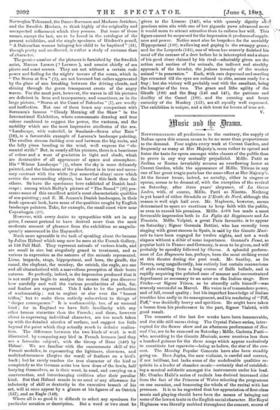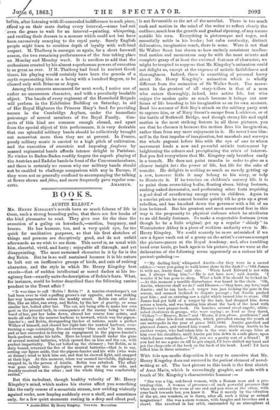Music a0 gram.
NOTWITHSTANDING all predictions to the contrary, the supply of Italian opera this season seems to be no more than proportionate to the demand. Four nights every week at Covent Garden, and frequently as many at Her Majesty's, seem rather to spread and foster the taste for opera amongst wider classes of the public than to prove in any way mutually prejudicial. Mdlle. Patti as Zedina or Rosins invariably secures an overflowing house at Covent Garden, while the appearance of Mdlle. Titiens in any one of her great tragic parts has the same effect at Her Majesty's. At the former house, indeed, no novelty, either in singers or operas, seems to be dreamt of, with the exception of the revival on Saturday, after three years' abeyance, of La Gazza Ladra, with, of course, Mdlle. Patti as Ninetta. Nothing is yet heard of either Straddle or L'Etoile du Nord, although the season is well nigh half over. Mr. Mapleson, however, seems determined to spare no exertions to keep faith with the public, or even to exceed his promises. Mdlle. Att6t has made a most favourable impression both in La Figlia del Reggintento and La Traviata. Mdlle. Volpini, a great Paris favourite, is to appear on Saturday ; Signor Geremia Bettini, who has recently been singing with great success in Spain, is said by the Gazette Musi- cale to have been engaged for twelve nights, and not a week elapses without a dibilt of some importance. Gonnod's Faust, so popular both in France and Germany, is soon to be given, and will probably be speedily followed by Oberon. A splendid perform- ance of Les Huguenots has, perhaps, been the most striking event at this theatre during the past week. Mr. Sautley, as Be Nevers, sang magnificently, has entirely lost certain mannerisms of style resulting from a long course of Balfe ballads, and is rapidly acquiring the polished ease of manner and unconstrained deportment so necessary to an actor on the Italian stage. Herr Fricke—or Signor Fricca, as be absurdly calls himself—was scarcely successful as Marcel. His voice is of tremendous power, and of full, round quality ; but his imperfect knowledge of Italian troubles him sadly in its management, and his rendering of "Piff, Paff," was decidedly heavy and spiritless. He might have taken a lesson from his predecessor in the part, Signor Vialetti, with good result.
The concerts of the last few weeks have been innumerable, and the tide still seems rising. The Crystal Palace series, inter- rupted for the flower show and an afternoon performance of Box and Cox, are to be resumed on Saturday ; Mdlle. Carlotta Patti— who, according to the Gazette Musicale, never receives less than a hundred guineas for the three songs which appear exclusively to constitute her repertoire—being as before, the star of the con- cert. The Monday Popular Concerts have also been steadily going on. Herr Japha, the new violinist, is careful and correct, if not brilliant, but lacks some of the undefinable qualities re- quisite in a leader of chamber music—certainly that of establish- ing a musical solidarite amongst the instruments under his lead. Mr. Charles Halle's series of recitals has derived increased éclat from the fact of the Princess of Wales selecting the programme on one occasion, and honouring the whole of the recital with her presence. It is to be regretted that her appreciation of first-class music and playing should have been the means of bringing out some of the lowest traits in the English social character. HerRoyal Highness was literally mobbed throughout the concert, scores of lacliees, after listening with ill-concealed indifference to each piece, Wood up on their seats during every interval,—some had not "even the grace to wait for an interval—pointing, whispering, and rustling their dresses in a manner which could not but have been excessively annoying to the royal party. Surely English people might learn to combine depth of loyalty with well-bred respect. M. Thalberg is amongst us again, for a short farewell season, the two remaining performances of the four taking place on Monday and Monday week. It is needless to add that the enthusiasm created by his almost superhuman powers of execution is as great as ever. If M. Thalberg had lived in ancient Greek times, his playing would certainly have been the genesis of a myth representing him as a being with a hundred fingers, to be classed only with Briareus or Argus.
Among the concerts announced for next week, I notice one of rather an uncommon character, and with a peculiarly laudable object. The bands of every regiment of the Household Brigade will perform in the Exhibition Building on Saturday, in aid of Her Royal Highness the Princess Mary's fund for providing nurses in the Cambridge Asylum, under the immediate patronage of several members of the Royal Family. Con- certs of this kind are common enough abroad, and apart from the special object of this performance, it is very desirable that our splendid military bands should be collectively brought out somewhat more than they are at present. In France. purely military music is carried to a high pitch of cultivation, and the execution of eccentric and imposing fanfares by massed regimental bands affords intense delight to Parisians. No visitor to Baden-Baden readily forgets the superb playing of the Austrian and Badoise bands in front of the Conversationshaus, and there is certainly no reason why our military bands should not be enabled to challenge comparison with any in Europe, if they were not so generally confined to accompanying the talking at flower shows and fetes, and more frequently gave regular con-































 Previous page
Previous page